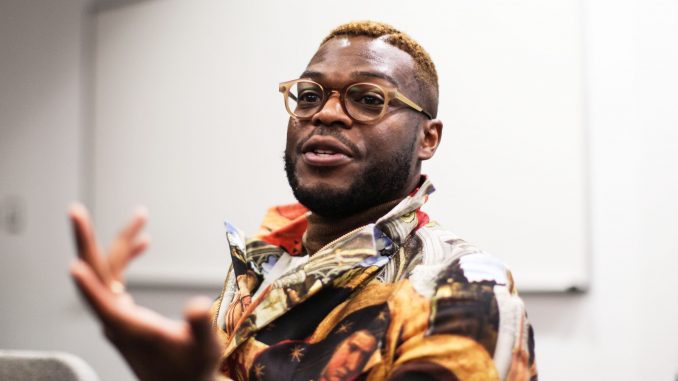
In the post-credit scene of “Black Panther,” the titular character T’Challa wears a scarf made by Walé Oyéjidé.
Oyéjidé, a 2010 Beasley School of Law alumnus, owns an African-inspired clothing line, and his most recent work was featured in the African superhero blockbuster hit.
In his designs, Oyéjidé is known for repurposing prominent historical art to feature people of color, which he describes as “Africana Renaissance.” One of his silk scarves, “Annunciation,” depicts the Christian scene of Mary and the baby Jesus as Black surrounded by angels and shepherds. In the Bible, the Annunciation is the announcement of the conception of Jesus to Mary and has been replicated in many European paintings.
Through his clothing line, named Ikiré Jones, Oyéjidé wants men to embrace fashion that isn’t seen every day in magazines and popular culture.
“In general, men in the West are afraid of being seen as though they care about the way they look, and so they need examples,” Oyéjidé said. “Most of us feel like we need to be led towards an acceptable presentation of ourselves.”
“Black Panther” has made more than $1 billion in global box office sales in the month since its release.
Oyéjidé spoke at a panel last Thursday at the Tyler School of Art. He was joined by curator and historian Shantrelle Lewis, who is also a 2007 African American studies alumna, and Devin Morris, the editor of 3 Dot Zine, a publication that celebrates Black, brown and marginalized people. Their talk focused on Black masculinity in fashion and representation in art and media.
Ikiré Jones is run by a two-man team, with Oyéjidé as the designer and writer, and his partner, Samuel Hubler, as the tailor. The brand focuses on men’s fashion, including items like jackets, scarves, shirts and coats.
“The brand is not just a clothing brand,” said Oyéjidé, who was born in Nigeria before moving to the United States as a teenager. “It’s very much about culture and telling stories that are relevant to people of a certain diaspora and showing us in a noble light.”
The two men use their clothing, as well as a writing series featuring Oyéjidé’s poetry, to tell the stories of the African diaspora.
“Everything we make is intended to show people who haven’t been represented positively in the best possible light, no matter where they’re from,” Oyéjidé told Smith Blog, a quarterly Australian magazine. “It happens to be inspired by my African heritage, but it’s for everybody. Making [garments] for the character King T’Challa is very much the highest apex of what we do every day for ordinary people. We dress people as kings, whether they be refugees or people of immigrant descent.”
Oyéjidé said he wants his art to tell the story of all marginalized populations, especially people who have migrated to Western countries.
Recently, he visited Rome to photograph refugees who are residing there and frequently subjected to persecution.
“[We’re] dressing them up in such a way that they’re regarded as celebrities,” Oyéjidé said at the panel.
He said he hopes to send a portion of his sales to benefit the refugees living there.
During the panel, all three members spoke about the novelty in the U.S. of well-dressed Black men. Oyéjidé hopes to combat this in his work by establishing a Black presence in fashion and in his use of everyday people as models. He added that he wishes to create a world where it’s not a shock to see Africans and African-Americans on stage and celebrated.
“It’s still uncommon to see us pictured in museums, in fashion magazines, on runways as creatives, who are actually owning and running businesses, who are successful and have integrity,” he said.
One of the organizers of the event, Joy Ude, an adjunct fibers and material studies professor, said she was amazed by Oyéjidé’s design work. Because Tyler doesn’t have a fashion design program, she said it was valuable to have the panelists talk to students.
“I hope that they are introduced to subjects they have not thought about before…that they have a new view of it or it opens up their mind [to] the ways of thinking about representation,” Ude said.
Presina Mottley, an undeclared freshman in Tyler, said she loves fashion and African culture. She attended the panel because of Oyéjidé’s work in “Black Panther.”
“I really liked how they glorify the African culture rather than portray us as slaves,” Mottley said about the film. “It’s definitely a game-changer, in not only the comic book industry, but also the movie industry, and obviously you can see that in the sales that they’ve been receiving.”
Oyéjidé hopes that through his work, people who are underrepresented can see themselves in fashion.
“For me, the hope is that the little works that I do is an example for people who have similar or bigger goals and aspirations,” he said. “If anything, it’s just the idea that you can pursue things that you believe in if you put the work in, and you can carve out your own niche in the world.”



Be the first to comment